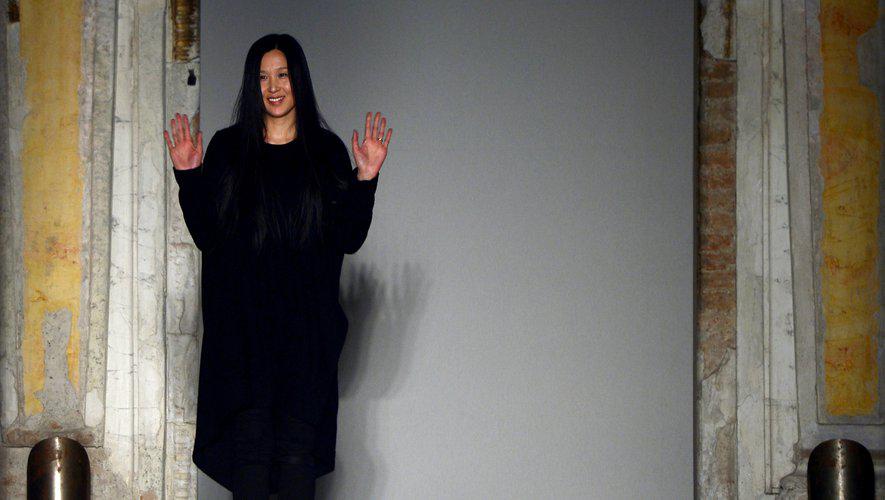In Paris, the fashion capital, “Made in China” to conquer luxury<
Still often synonymous with cheap clothes, "Made in China" is gradually gaining a foothold in luxury thanks to high-end Chinese brands setting up in Paris, the fashion capital, to reach a more international clientele.
Read alsoTrump's sanctions against China have had only modest results
“We show fashion that comes from China but is aimed at the whole world, by creating new references in this country. We are putting forward a new Made in China of quality and refinement ”, summarizes to AFP the Frenchwoman Isabelle Capron, general manager of Icicle Paris. Founded in Shanghai in 1997, this Chinese brand has 270 stores in China, for a business volume of 250 million euros. In September, it opened its very first international boutique in Paris, nearly 500 m2 on Avenue George V, in the heart of the “golden triangle” of luxury.
“It is a springboard for our internationalization. Paris is the capital of fashion, and the objective is to give visibility to the brand”, underlines the representative of the Chinese brand which had become known in France by buying the fashion house Carven in 2018. The credo of 'Here? Only natural materials - cashmere, silk, cotton, wool, linen - and vegetable dyes - onion, walnut bark, isatis flower, tea. The clothes are made in China in three factories owned by the group. But even today, clothes stamped "Made in China" remain synonymous with poor quality for many French and European consumers.
"The stereotypes are very tenacious: seven years ago, when I said that I was joining a Chinese group, some people looked at me with this image in mind that the Chinese have no taste, that they of poor quality. But today, there is a real shift, this new wave of Chinese brands is a ground swell”, judges Isabelle Capron. “I never felt any hostility towards me or closure. On the contrary, there has always been a lot of interest,” says Dawei, a 38-year-old Chinese designer who has been parading since February for Paris Fashion Week with the label bearing his name, which claims production in China “with Italian materials. , French, Japanese and Chinese”.
“Perhaps as I studied in Paris, did my internships in big houses like Balenciaga or John Galliano and created my brand in Paris, I was never really considered as a foreigner from China. I am a designer who lives and works in Paris and who is of Chinese origin”, he summarizes.

Just learned how to acid etch steel. I'm gonna have fun. http://t.co/VDUVpeJ2
— jake Sat Jun 02 16:42:52 +0000 2012
“Chinese Chanel”
Uma Wang, Masha Ma, Yang Li, Jarel Zhang... Several Chinese designers are on the official calendar of Paris Fashion Week, alongside the pioneer Shiatzy Chen, who arrived in 2009 and was the first Chinese brand to set up shop in the famous Montaigne avenue. Why Paris? "Because it's the cradle of couture, and having a design studio there allows us to explore Western tailoring techniques, and also to be at the heart of the latest trends," Wang Chen Tsai told AFP. -Hsia, founder of Shiatzy Chen.
The house, launched in 1978 in Taiwan, has 70 stores in Asia. The collections, made in Shanghai and Taipei, seduce by the mixture of traditional know-how and contemporary cuts. "We use a lot of craftsmanship and we have always been careful to incorporate Chinese elements into our creations," said Wang Chen Tsai-Hsia, whose brand is often described as "Chinese Chanel".
Icicle, for its part, is betting on a more "international" style and the growing demand for "natural and sustainable fashion: our core target is young professionals who want a sleek and durable garment", summarizes Isabelle Capron, whose brand offers a cashmere sweater at 550 euros, or a wool and silk coat from 1,150 euros. The brand wants to be more than a showcase. “We have a real plan for Paris and Europe. We will open a second address at the end of 2020 in the Faubourg Saint-Honoré district”, announces Isabelle Capron.
Read alsoSino-American conflict: Europe unable to situate itself in this new landscape
Because for luxury expert Eric Briones, "to be desirable, including to its Chinese customers, a Chinese brand cannot be limited to shops in its country, it must exist in Paris, which fascinates" the Chinese, representing today some 35% of luxury goods consumers in the world. According to the co-founder of the “Paris School of Luxury” fashion school, this “rise of a new + Made in China + is only the beginning of a revolution, initiated by the young Chinese generation who want to consume Chinese. A return of affection for local brands which first affected streetwear and began to extend to luxury”.


 Tags:
Tags: Prev
Prev







